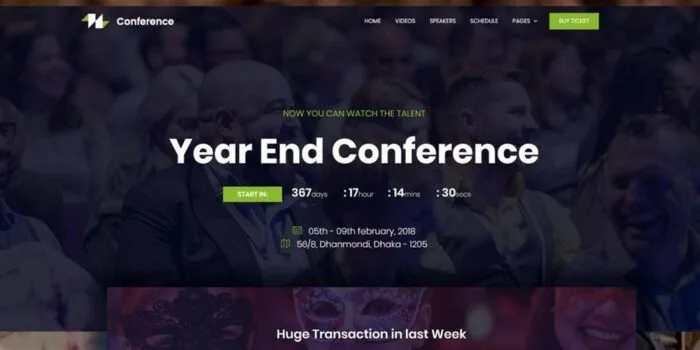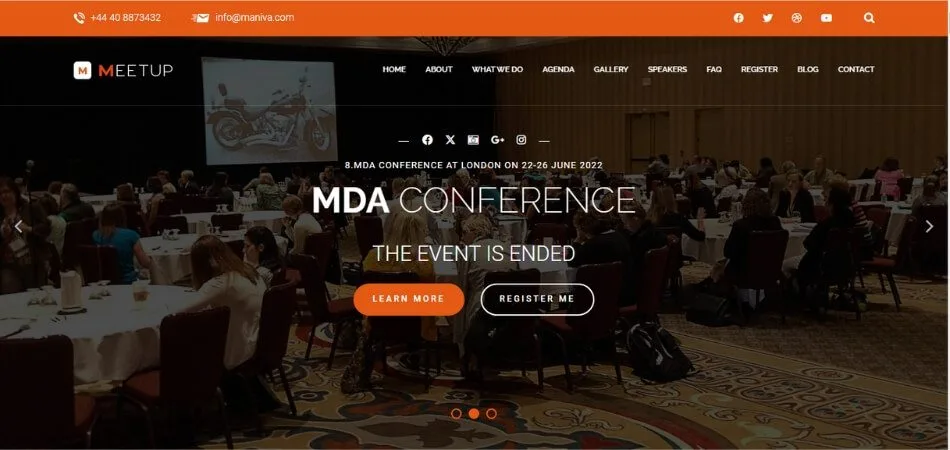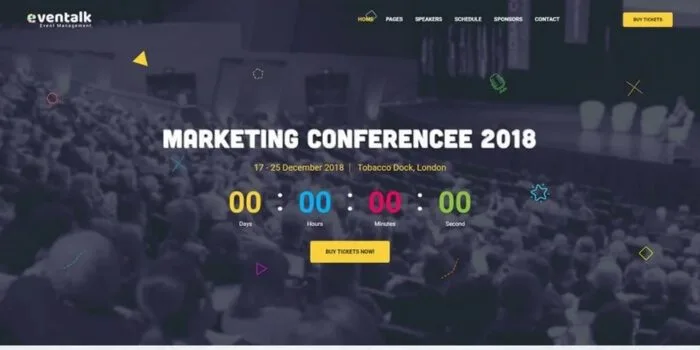People who are aiming to host a successful conference, often don’t know where to start with the online aspect. Several conference websites may give you ideas, but the real concern is: How do I create a conference website properly?
A conference website designing process involves a blend of strategic planning, user-friendly design, and easy-to-use functionality. From selecting a suitable platform to designing an intuitive interface and integrating essential features like ticketing and schedules, you can create an effective digital website for your conference.
In this blog, we will present you with a step-by-step guide that will help you create an effective online website that captivates your audience and ensures the success of your event.
What Is a Conference Website?
Organizing a conference involves numerous moving parts, and one crucial aspect is the creation of a conference website. Essentially, it’s a digital platform designed to provide attendees with all the necessary information about the event, including schedules, speakers, registration details, and any other pertinent updates.

These websites serve as a central hub where participants can access vital information before, during, and after the conference. They offer a convenient way for attendees to register for the event, explore the agenda, and familiarize themselves with the speakers and topics.
Additionally, conference websites often feature interactive elements, such as chat forums or networking opportunities, to improve the overall experience for participants.
Moreover, a well-designed conference website reflects the professionalism and organization of the event, making it more appealing to potential attendees. It serves as a marketing tool, attracting participants by showcasing the value and relevance of the conference. Developing a conference website is costly. So understanding the conference website cost is essential as investing wisely in its design and functionality can significantly impact the event’s success.
With the right design and functionality, a conference website can streamline the registration process, facilitate communication, and ultimately contribute to the success of the event.
How Do I Create a Conference Website?
Creating a conference website can be exciting and daunting at the same time, and with the right approach, you can streamline the process and ensure a successful outcome. Here are some step-by-step instructions to help you create your conference website:
Step 1: Define Your Objectives
Clearly outline the goals and objectives of your conference website. Determine the purpose of the website, whether it’s for event registration, providing information to attendees, or facilitating networking.
Step 2: Choose a Platform
Select a suitable platform for building your conference website. Consider factors such as ease of use, customization options, and budget. Popular platforms include WordPress, Squarespace, and Wix.
Step 3: Select a Domain Name and Hosting
Choose a domain name that reflects your conference and is easy to remember. Purchase domain hosting from a reliable provider to ensure your website is accessible online.
Step 4: Design Your Website
Design your website with a focus on user experience and aesthetics. Select a clean and professional design template that aligns with the theme of your conference. Customize the layout, colors, and fonts to create a cohesive look.
Step 5: Create Essential Pages
Create essential pages such as Home, About, Agenda, Speakers, Registration, and Contact. Provide detailed information about the conference, including dates, location, agenda, and keynote speakers.
Step 6: Integrate Registration and Payment Systems
Set up a registration system to allow attendees to sign up for the conference online. Integrate a secure payment gateway to process registration fees, if applicable. Provide clear instructions for registration and payment.
Step 7: Optimize for SEO
Optimize your website for search engines to improve its visibility online. Use relevant keywords in page titles, meta descriptions, and content. Create descriptive alt tags for images and optimize page loading speed.
Step 8: Test and Launch
Thoroughly test your website for functionality, compatibility, and responsiveness across different devices and browsers. Check for any errors or broken links. Once everything is working smoothly, launch your website to the public.
Step 9: Promote Your Website
Promote your conference website through various channels, including social media, email newsletters, and industry forums. Encourage attendees to share the website with their networks. Monitor website traffic and engagement metrics to measure the effectiveness of your promotional efforts.
By following these step-by-step procedures, you can build a conference website that effectively promotes your event and provides attendees with valuable information.
Benefits of Having a Conference Website
A conference website is the best way to engage more audiences if you’re a constant conference organizer. So, investing in a website will be a wise decision, and here are the benefits you will experience:
Enhanced Visibility
- Increase your event’s visibility by having a dedicated online presence.
- Reach a wider audience beyond your immediate network through search engine optimization.
- Attract potential attendees who may discover your conference while searching for related topics online.
Convenient Information Access
- Provide attendees with easy access to all relevant information about the conference.
- Display event details such as the agenda, speakers, and venue location in one centralized location.
- Allow participants to access important updates and announcements in real time, ensuring they stay informed.
Streamlined Registration Process
- Simplify the registration process for attendees by offering online registration through your conference website.
- Eliminate the need for manual paperwork and streamline data collection for event organizers.
- Integrate secure payment gateways to facilitate smooth transactions and increase registration efficiency.
Engaging Networking Opportunities
- Facilitate networking among attendees by incorporating interactive features such as chat forums and discussion boards.
- Provide a platform for participants to connect with speakers, sponsors, and fellow attendees before, during, and after the event.
- Build meaningful connections and collaboration opportunities that bring together conference participants.
Having a conference website offers numerous benefits, from increasing visibility and providing convenient access to information to streamlining the registration process and enhancing networking opportunities. By leveraging these advantages, you can create a more engaging and successful conference experience for both organizers and attendees.
Common Mistakes To Avoid When Creating A Conference Website
When it comes to crafting a conference website, steering clear of common pitfalls is essential for success. Here are some mistakes you should avoid under various subheadings:
Neglecting Mobile Responsiveness
One common error is overlooking the importance of mobile responsiveness. Failing to optimize your website for different screen sizes and resolutions can alienate a significant portion of your audience who access the site from smartphones or tablets. Ensure a smooth user experience across devices by testing on various platforms and promptly addressing any usability issues.
Lack of Clear Navigation
Complex navigation structures can hinder visitors’ ability to find essential information about the conference. Keep navigation menus simple and intuitive, with clearly labeled sections for agenda, speakers, registration, and contact. Implement features like breadcrumbs or a search function to aid users in navigating the website efficiently.
Insufficient Content Planning
Without effective content planning, your website risks becoming cluttered and overwhelming for visitors. Define a clear content strategy, prioritizing important details such as event dates, keynote speakers, and registration deadlines. Organize information logically and avoid unnecessary clutter to ensure a smooth user experience.
Overlooking Budget Allocation
The most common mistake when creating conference websites is not properly tracking expenses, which can lead to unexpected expenses. It is important to implement conference expense categorization from the very beginning. This ensures every part of the website development, from design to adding features, gets enough budget and oversight. This approach helps keep finances in check and guides where to best spend money for the most benefit.
Ignoring SEO Optimization
Neglecting search engine optimization (SEO) can limit the visibility of your conference website and reduce organic traffic. Conduct keyword research to identify relevant terms and phrases related to your conference topic and audience. Optimize meta tags, headings, and content with keywords to improve your website’s ranking in search engine results.
Overlooking Accessibility Considerations
Failure to address accessibility considerations can exclude individuals with disabilities from accessing your conference website. Ensure compliance with accessibility standards such as Web Content Accessibility Guidelines (WCAG) to accommodate users with impairments. Provide alternative text for images, captions for videos, and keyboard navigation options for inclusivity.
By avoiding these common mistakes when creating your conference website, you can optimize the user experience, maximize engagement, and increase the overall success of your event.
FAQs About How Do I Create a Conference Website?
The process of creating a conference website involves a variety of elements that can seem overwhelming, especially if you’re new to it. Here are some frequently asked questions to help you overcome the challenges of building an effective conference website.
How Can I Ensure My Conference Website is Secure?
Security is paramount for a conference website, especially if handling personal information and payments. Use HTTPS encryption, implement secure payment gateways, and regularly update your website’s software. Additionally, consider adding firewalls and conducting security audits to protect against potential threats.
What are Some Effective Promotion Strategies for My Conference Website?
Promoting your conference website can significantly increase attendance. Utilize social media marketing, email campaigns, and online advertising to reach potential attendees. Collaborating with industry influencers and using content marketing strategies like blogs or webinars can also attract interest and drive traffic to your site.
Should I Include Social Media Integration on My Conference Website?
Yes, integrating social media on your conference website can boost engagement and extend the event’s reach. Adding social media sharing buttons and live feeds allows attendees to interact and share updates. This strategy can also drive traffic to your website and increase visibility.
What Are the Benefits of Using Analytics on a Conference Website?
Analytics allows you to track website performance and user behavior. It provides insights into visitor demographics, popular pages, and traffic sources. Analyzing this data allows you to optimize the website, improve the user experience, and develop marketing strategies to increase attendance and engagement.
How Do I Choose the Right Hosting Provider for My Conference Website?
Selecting a reliable hosting provider is crucial for website performance. Consider factors such as uptime guarantees, customer support, and scalability options. Research user reviews and compare pricing plans to find a provider that fits your needs. A reliable hosting service ensures your website runs smoothly during high-traffic periods.
Conclusion
Designing a conference website is a crucial aspect of various event planning activities. By avoiding common mistakes such as neglecting mobile responsiveness and insufficient content planning, you can ensure an enjoyable user experience and maximize engagement.
So, you can follow these steps and best practices if you have little idea and are wondering: How do I create a conference website? You’ll be well-equipped to build a professional and effective online platform for your event.
Also, remember to prioritize clear navigation, SEO optimization, and accessibility considerations to maximize the success of your event. With the right approach and guidance, creating a conference website becomes an achievable task.







